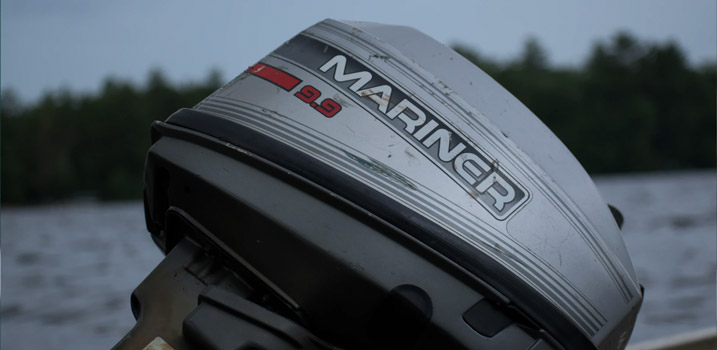
When buying a boat, you’ll often have the option between getting one with an outboard motor and one with an inboard motor. The names are somewhat self-explanatory in terms of placement, but each position comes with its own strengths and weaknesses. How can you make the right decision for your boat?
The Advantages of an Outboard Motor
Let’s start by covering some of the biggest advantages of an outboard motor:
- Ease of use. For starters, outboard motors are a little easier to use. Because they’re conveniently situated at the back of the boat, they’re easy even for an inexperienced captain to use.
- Ease of access. Outboard motors are also highly accessible. You can see them and reach them at all times. This makes it much easier to maintain them, inspect them, and keep them clean and functional.
- Ease of storage. It’s easy to remove an outboard motor thanks to its position on the rear of the boat. That means when you’re storing the boat, you can remove the motor and prevent it from accumulating debris and growth.
- Upgrade possibilities. If you’re choosing a new motor, you probably won’t be upgrading for a long time. But one of the best advantages of an outboard motor is that they’re remarkably simple to upgrade. Even with minimal experience, you should have no issue swapping out the old outboard motor and installing a new one.
- High reliability. Outboard motors are known for their reliability, which is partially a function of how easy they are to remove, store, and maintain. As long as you keep them in good condition, they should last you many years and continue to serve you well.
- Less occupied space. Because the inboard motor is situated in the interior, you’ll end up with more cabin space if you have an outboard motor. If you plan on entertaining, or if space is a major priority for you, an outboard motor may be better.
- Low cost. Typically, outboard motors also cost less than their inboard counterparts. If you’re buying a boat on a budget or if you’re willing to make some compromises to remain under budget, an outboard motor might be your best option.
The Advantages of an Inboard Motor
There are also some advantages to having an inboard motor:
- Higher power level. Outboard motors are nice, but there’s a strict upper limit to the amount of horsepower and torque they can generate. If you’re interested in a power boat, or if you just want your boat to have more power at its disposal, an inboard motor is practically the only option.
- Higher fuel efficiency. In most situations, an inboard motor will be more fuel-efficient than an outboard motor – especially if you’re operating a large boat.
- Universal utility. For larger boats, outboard motors simply aren’t a logistical possibility. But an inboard motor can be used for practically any boat, making them universally usable.
Hybrid Motor Options
There are also hybrid motor options that attempt to bring you the advantages of both inboard and outboard motors. However, they share more in common with outboard motors than they do with inboard motors. They’re typically stored in the mid-ship region, but they feature a propeller shaft that passes through the hull of your vessel.
How to Make the Right Decision
Before you make your final decision, you’ll need to keep an open mind and do some further research. You may be leaning toward one motor style over the other, but the more information you have at your disposal, the closer you’ll come to the “right” decision for you.
You’ll also need to consider a number of variables, which are unique to each individual:
- Boat model. What type of boat are you thinking of purchasing? If you want a power boat, or if you’re looking for a larger vessel, an inboard motor may be your only viable option. Generally speaking, an inboard motor can work for almost any type of boat. If you’re thinking of something smaller, and you’re not especially worried about power or speed, an outboard motor may be preferable.
- Cost. Your budget will likely play a significant role in how you decide which motor to use for your boat. Onboard motors are less expensive to purchase than inboard motors, and they’re also easier to install. Also, because they’re easier to maintain and they often have a long lifespan, they can continue saving you money throughout your ownership.
- Power. How much power do you want to have at your disposal? If you have a single outboard motor, you’re probably not going to be setting any land speed records. You’ll unlock much more horsepower and torque by investing in an inboard motor.
- Maintenance. Do you plan on doing your own maintenance? If so, you may want to have easy accessibility to an outboard motor. It’s much friendlier to newcomers in the boating world and will cost you less time and money.
- Flexibility. Each motor offers a different type of flexibility. For example, if you want an inboard motor for sure, you’ll have a much wider variety of boat styles to choose from, while the outboard motor may be somewhat limiting. That said, outboard motors are much easier to install, swap out, and upgrade, so if you want to leave more options for yourself in the future, an outboard motor is probably the right choice.
It’s important to remember that there isn’t one superior style of boat; inboard, outboard, and hybrid motors all have advantages and disadvantages. It all comes down to your personal priorities.
Choosing between and inboard and outboard motor is a major decision that will impact how you use the boat for years to come. But everything starts with choosing the right boat. If you’re in the market for a new vessel, or if you’re interested in upgrading, be sure to check out TheYachtMarket’s robust selection of new and used boats for sale!